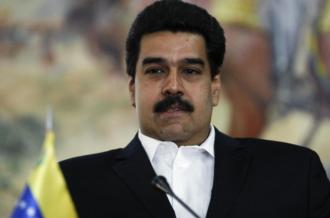Are these men Venezuela’s next leaders?
National Assembly Speaker Diosdado Cabello and acting President Nicolas Maduro both have claims to future leadership.

The death of Hugo Chavez, the Venezuelan president, had reignited debate about who should rightly serve as interim president.
Under Venezuela’s constitution, Diosdado Cabello, the speaker of the National Assembly, should have taken over as leader.
However, Elias Jaua, the country’s foreign minister, announced on Tuesday that Nicolas Maduro, Chavez’s hand-picked successor, would take over as interim president pending the next election which would be held within 30 days.
Jaua told state television: “It is the mandate that comandante President Hugo Chavez gave us.”
On Friday, Maduro was sworn in as acting president at a ceremony at the National Assembly in Caracas, just after hours a state farewell for Chavez.
Nicolas Maduro: Unconditional ally
Maduro, a former trade unionist, was one of the president’s closest advisers. He had been minister of foreign affairs since 2006.
Born in Caracas, Maduro was educated at a public high-school and did not attend university.
He became politically active as a teenager, joining the Socialist League, and travelling to Cuba for training in union organising.
Upon returning home, he joined the union for workers in the Caracas metro system and rose up through the ranks.
 |
| Maduro represents the civilian sector inside the ruling party [Reuters] |
“Maduro has a very strong ideological orientation, close to the communist ideology,” Professor Ramon Pinango, a sociologist from the Venezuelan University of IESA, told Al Jazeera.
“Contrary to Diosdado, he is not very pragmatic.”
He was first elected to office in 1998 and quickly became one of Chavez’s most loyal associates.
He became foreign minister in 2006 and is considered partially responsible for spearheading the creation of the Bolivarian Alliance for the Americas (ALBA) with other left-leaning Latin American governments and expanding ties between Venezuela, Russia and China.
During Chavez’s visits to Cuba for treatment, Maduro was among the few aides to be seen at his side.
In October 2012, he was named vice-president and in December Chavez named him his preferred successor, following the recurrence of his cancer.
Inside the socialist party, Maduro is seen to be “closer to the Cubans and the Castro brothers” than Cabello, Ysrael Camero, professor and political analyst at the Central University of Venezuela, told Al Jazeera.
“He represents the civilian sector inside the political party,” Camero noted, as opposed to Cabello – who is said to have more support from the military.
Maduro is tipped to be the PSUV party candidate when elections are held in 30 days.
Diosdado Cabello: A military man
Well-connected, wealthy and considered a shrewd politician, Cabello had been a friend of Chavez for more than two decades.
Born in El Furrial, Monagas State, Cabello has a background in engineering, including a graduate degree from Andres Bello University.
As a former member of the armed forces, Cabello joined Chavez’s attempted coup against President Carlos Andres Perez in February 1992; the coup failed and he was jailed for two years.
 |
| ‘Diosdado Cabello has the military power. He is very pragmatic,’ one analyst told Al Jazeera [AFP] |
Following Chavez’s electoral victory in 1998, Cabello helped to set up the pro-Chavez grassroots civil society organisations known as Bolivarian Circles which are designed to empower workers and the poor.
He became Chavez’s chief of staff in 2001.
On April 13, 2002 – during a two-day coup against Chavez – Cabello took on the duties of the presidency, facing off against Pedro Carmona, the head of Venezuela’s chamber of commerce, who had been appointed president by the unelected coup leaders.
Cabello’s first order was to send a group of elite navy troops to rescue Chavez, who was being held prisoner at a base on a Caribbean island.
A few hours later, Chavez was back in office.
Cabello was rewarded for his actions: serving as interior and justice, infrastructure and public work minister.
He governed the state of Miranda from 2004 until 2008 when he was defeated at the ballot box by opposition candidate Henrique Capriles. He was subsequently appointed public works and housing minister.
“Diosdado Cabello has the military power. He is very pragmatic,” Pinango told Al Jazeera.
“Nonetheless, it is clear that he does not have the [full] support of his own party” – although he apparently has strong backing within the armed forces.
The opposition has criticised Cabello’s business interests, calling him part of the “Boli-bourgeois” in reference to officials who have become wealthy during the Chavez era.
Follow Elizabeth Melimopolous on Twitter: @Liz0210